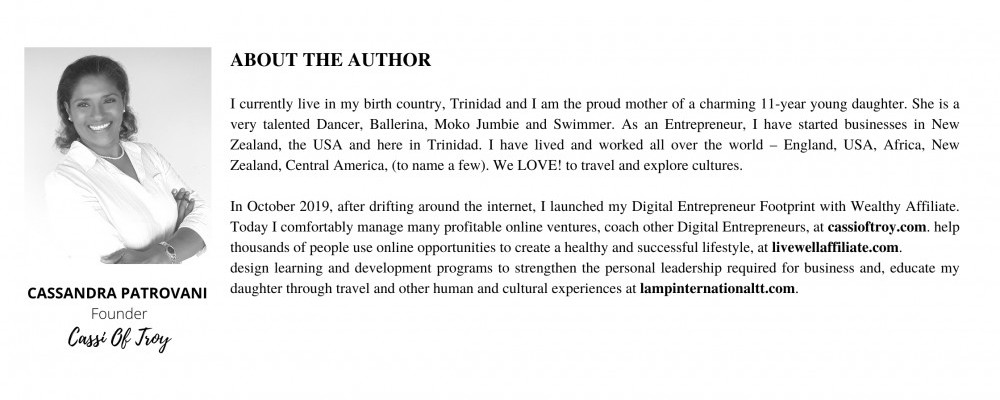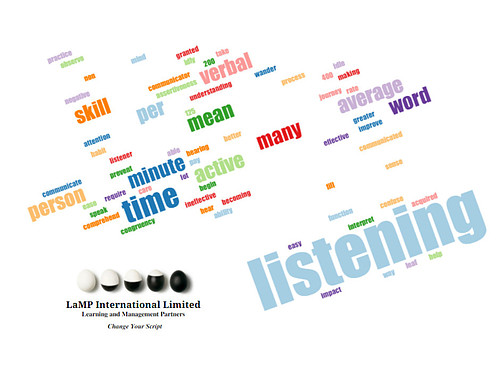Active Listening
Active listening means making sense out of what we hear. To be able to do that, listening requires that you pay attention, observe and interpret with care. It means understanding what is being communicated, both verbal and non-verbal. When we practice effective listening we function with greater assertiveness and congruency.
Too many people take their listening skills for granted. They confuse hearing with listening. This has a negative impact on their ability to communicate with ease.
The average person speaks at a rate of 125-200 words per minute. The average listener can process and comprehend up to 400 words per minute. This leaves a lot of time for your mind to wander idly and prevents you from active listening.
Over time, you would have acquired many ineffective listening habits to fill in the idle time.
Here are 8 easy ways to improve your listening skills. They will help you to begin the journey of becoming a better communicator.
1. Make Eye Contact
How do you feel when someone does not look at you when you are speaking? Do you feel disrespected or ignored?
I know that I do.
In a world of technology, where we hide behind cell phones, it is even worse. Nothing is more disrespectful than when you are talking with someone and they give their attention to their cell phone instead.
When you are speaking with someone, engage them with your eyes. But, be careful not to stare. Every so often, move your eyes to the side of their face. This will avoid discomfort.
2. Use Affirmative Head Nods And Facial Expressions
The effective listener shows interest in what is being said. A good way to do this is by small gestures. This could be a slight nod of your head or, the raising of your eyebrows.
Pay attention to your body posture as well. Crossed arms say that you are not interested. It can also be intimidating.
Allow your posture to be open and welcoming.
3. Avoid Distracting Gestures Or Actions
The other side of showing interest is to avoid actions that suggest your mind is somewhere else. Do not look at your watch, shuffle papers or, my biggest pet peeve, pay more attention to your cellular phone. (Oh! I said that already.)
That is downright rude and very disrespectful.
A slight movement forward or a light touch can also be positive. Be mindful of the other person’s reaction though. And please, do not overdo it.
4. Ask Questions
An involved listener analyses what (s)he hears and asks questions to be sure that (s)he understands. This provides clarity and ensures understanding. It shows the messenger that you are participating in their sharing.
Questions also help to bring greater clarity. If you are unsure about what is being said, ask a question.
- “Why do you think so?”
- “What do you mean by that?”
- “When did that happen?”
- “Where did that take place?”
These are fact-finding and open-ended questions. Your messenger will appreciate you much more for your interest.
5. Paraphrase
Restate what the speaker has said to you in your own words. For example:
- “What I hear you saying is . . .?” or,
- “Do you mean . . .?” or,
- “If my understanding is correct . . . .”
This is an excellent control device to check whether you are listening. It is also a control for accuracy – verifying the accuracy of your understanding.
Very often, when the message is re-gifted, you get more information. This makes for an even better understanding.
6. Avoid Interrupting The Speaker
Allow the speaker to complete his/her thoughts BEFORE you try to respond. Do not try to second guess what the speaker’s thoughts are or what they mean to say. Let them deliver their own message.
It is an unpleasant feeling when you are always interrupted. You lose your trend of thought. Your expressions are not connected.
In essence, you lose interest.
Remember, an active listener sees the importance of the other person and what they have to say.
7. Do Not Overtalk
Most of us would rather speak our own ideas than listen to what someone else has to say. Too many of us listen only because it is the price we have to pay to get people to let us talk.
This happens a lot with salespeople. They are more concerned with telling you what they have to say. Talking a lot can be off-putting. It also says that you are more important.
I am always reminded of this saying:
You have two ears and one mouth for a reason. To speak less and listen more.
8. Make Smooth Transitions Between The Roles Of Sender And Receiver
This is easier said than done.
But, if you are an active listener, you will soon learn how to bob and weave through your conversations. You will become more observant and pay attention to the other person’s body language. Everything that is not said will be evident to you.
Listen to their tone. Is their voice raising and getting stronger? Or, is it softening and lowering?
These are indications that they want to talk more or pass the attention to you.
The devil is in the details.
Always bear that in mind and make the small things important. Soon you will become a sort-after conversationalist. Instead of people not wanting to engage with you, you will be an in-demand communicator.
Closing Thoughts . . .
I have not always been an active and engaged listener. As an introvert, I was very absorbed with my own thoughts and feelings. They did not allow me to make room for others.
As I learned to be more assertive and my behaviour became more congruent, I changed.
Over time, I became genuinely interested in what others had to say. I enjoyed the details in discussions and made time to understand.
That journey, although difficult and long, led me to where I am today. As a Coach to others, I now support their journeys. I help them to become more effective and active listeners.
I am living proof that it is possible to Change Your Script.


